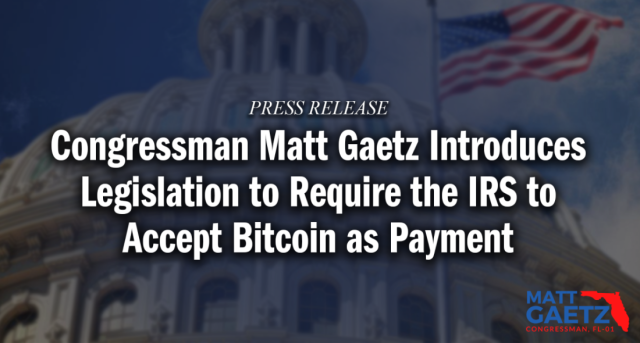Florida Congressman Matt Gaetz has ignited a fresh debate on the intersection of cryptocurrency and traditional finance. This week, Gaetz introduced a bill proposing Bitcoin (BTC) as a legitimate payment method for federal income taxes in the United States. The proposal aims to usher in a new era of tax efficiency and technological leadership for the nation.
Can Bitcoin Handle America’s Tax Bill?
Gaetz, a Republican and vocal advocate for cryptocurrency, sees Bitcoin as a catalyst for a more streamlined tax system. He argues that integrating Bitcoin fosters innovation and positions the US at the forefront of technological advancement.

However, experts caution against a hasty embrace. Bitcoin’s notorious price volatility could introduce significant uncertainty into the tax payment process. Imagine owing $10,000 in taxes today, but by the time your Bitcoin transaction settles, the equivalent value could be much higher or lower. This volatility could create headaches for both taxpayers and the Internal Revenue Service (IRS).
Challenges Beyond Volatility
Security is another major concern. Cryptocurrency transactions, while boasting a decentralized and transparent ledger, are not immune to cyberattacks. Malicious actors could potentially exploit vulnerabilities to disrupt tax payments or even steal funds.
The IRS would need to implement robust security protocols to handle large-scale Bitcoin transactions. Additionally, the current infrastructure might not be equipped for such a drastic shift. Integrating Bitcoin into the existing tax filing system would require significant investment and development to ensure smooth processing and record-keeping.
Crypto Regulation And Stablecoin Alternatives
Despite the challenges, Gaetz’s proposal serves as a timely reminder of the evolving financial landscape. Cryptocurrency is here to stay, and governments around the world are grappling with how to regulate and integrate it. The recently passed Financial Innovation and Technology for the 21st Century Act (FIT 21) aims to establish a clearer regulatory framework for cryptocurrencies in the US.
This would provide much-needed clarity and stability for both businesses and consumers. Additionally, lawmakers are exploring the potential of stablecoins, cryptocurrencies pegged to the value of traditional assets like the US dollar. Stablecoins offer the benefits of crypto transactions, such as faster settlement times and potentially lower fees, without the price fluctuations associated with Bitcoin.
El Salvador’s Bold Experiment: A Case Study In Progress
One nation has already taken a leap into Bitcoin adoption: El Salvador. In 2021, El Salvador became the first country in the world to make Bitcoin legal tender. While the move has been met with both praise and criticism, it serves as a real-world experiment that the US can learn from.
Featured image from Shutterstock, chart from TradingView
Disclaimer: The article is provided for educational purposes only. It does not represent the opinions of NewsBTC on whether to buy, sell or hold any investments and naturally investing carries risks. You are advised to conduct your own research before making any investment decisions. Use information provided on this website entirely at your own risk.
Source link

